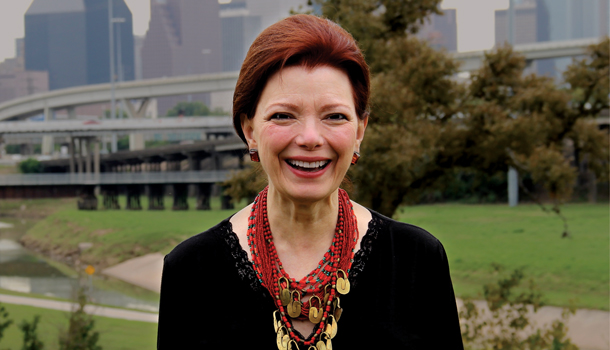
Heroes of Harvey: The Humanitarian-in-Chief
BakerRipley CEO Angela Blanchard adds to legacy with Harvey response, Heinz award.
By Marene Gustin
Angela Blanchard has received a lot of media attention lately—from announcing her departure from BakerRipley, to setting up a Tropical Storm Harvey shelter at the NRG Center, to receiving a prestigious award from the Heinz Family Foundation.
But Blanchard is quick to point out she didn’t do any of it alone. “Nothing I’ve done I did by myself,” she says.
Blanchard has served as CEO of BakerRipley (formerly Neighborhood Centers, Inc.) since 1995. Under her leadership, it has become the largest community-development nonprofit in Texas, serving more than 500,000 people in over 50 counties, including 70 service centers in the Houston area. BakerRipley’s annual budget of $250 million puts it in the top 1 percent of charitable groups nationwide.
“‘Appreciative community building’ for us means standing side-by-side with people, and working with them,” Blanchard says.
Related Content: More LGBTQ heroes of Harvey
When Tropical Storm Harvey hit, Harris County judge Ed Emmett tapped Blanchard and her BakerRipley team to turn the NRG Center into one of the largest shelters in the area. And they did it within hours.
“I grew up with hurricanes,” says Blanchard, who’s originally from Beaumont. Although Blanchard’s home in Houston’s Third Ward survived, members of her extended family in the Beaumont area were hit hard.
“The best part of a large family is that there’s always someone to help,” she says.
But so many of those displaced by Harvey had no one to take them in. As the shelter that was set up downtown at the George R. Brown Convention Center filled up, the County swung into action to open the NRG Center.
It opened within hours on August 29 and operated through September 23, housing and helping 8,500 people during its most crowded periods.
The NRG shelter was nothing like the Superdome in New Orleans after Hurricane Katrina, with its raw sewage and desperately overcrowded conditions. “Katrina changed everything,” says Blanchard, who travels the world lecturing on shelters and refugee settlements, and aiding the organizations that set them up. Safety and security are the first issues to be addressed when setting up a shelter, Blanchard says. “And then you have to be prepared, from the moment they walk through the front door. We had a specific person to greet each family as they entered, take them to their area, address their needs, and make sure they had food and clothing. BakerRipley workers can speak a combination of 16 different languages, so that was a huge aid because of our area’s diversity.”
In addition to Harris County and NRG staff, almost every health organization in the city helped out. The shelter was quickly outfitted with a pharmacy, a children’s play center, and even a section for displaced pets. Barrio Dogs and the city’s BARC shelter assisted with the pet center, and the Children’s Museum of Houston lent supplies for the kids’ zone. Aztec Rental Center arrived with truckloads of cots, tables, and chairs, while prepared food arrived from some of the city’s best restaurants. Money and donated items poured in from around the world.
“And there were hundreds and hundreds of volunteers wanting to work there,” Blanchard says. “So many that some days we had to turn them away because we had more volunteers than we had evacuees. But that’s just Houston. Everyone wanted to help.”
Still, an emergency shelter is just a short-term fix in a crisis. By late September, the long-term work had begun: finding places for people to live until their homes are repaired or rebuilt, finding jobs for many, and seeing to ongoing healthcare and other needs. Harvey caused billions of dollars in damages, left 300,000 people without electricity, and 30,000 at least temporarily homeless. BakerRipley will be in it for the long haul.
And even though Blanchard will be leaving the organization’s helm at the end of the year, she won’t stop being passionate about her humanitarian concern for the well-being of others. “I can’t tell you what I am going to be doing right now,” Blanchard says. “I haven’t really decided, but I’ll be continuing my work helping people whose lives have been disrupted by war and weather around the world.”
As an internationally recognized speaker and consultant to aid organizations and governments, Blanchard has been to disaster shelters and refugee camps across the globe. That’s where she plans to make use of the $250,000 unrestricted cash award that comes with her Human Condition Award from the Heinz Family Foundation. “It is a beautiful award; I am deeply honored,” Blanchard says. “And this was decided before Hurricane Harvey. It was just announced in the middle of the crisis.
“But I have passion for the work, and hope,” she adds. “The human spirit is not extinguishable; it is resilient.”
This article appears in the October 2017 edition of OutSmart Magazine.










